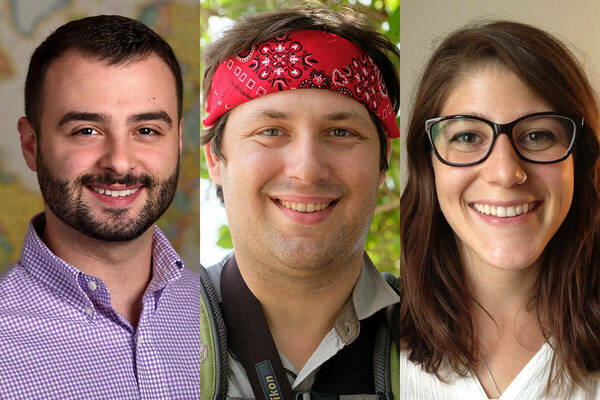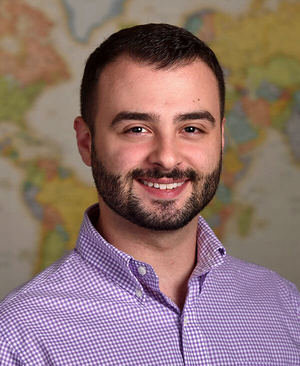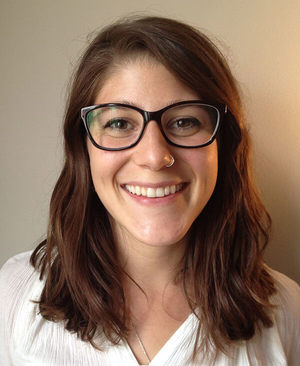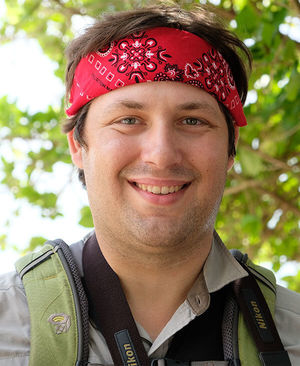
Amanda Cortez, Rieti Gengo, and Jeffrey Peterson came to Notre Dame in fall 2014 as part of the first cohort of the Ph.D. in Anthropology program. They, along with Angie Lederach (who was previously profiled here), will be the first students to earn a Ph.D. in Anthropology from Notre Dame. Two more members of that first cohort will finish the program next year.
Here, Cortez, Gengo, and Peterson reflect on their time in the program.
Cortez, a doctoral student affiliate of the Kellogg Institute for International Studies, focuses her research on multispecies relationships in Peru. She received a bachelor’s degree in anthropology from the University of Washington. Gengo, who is part of the joint Ph.D. program in anthropology and peace studies, received bachelor’s degrees in music and anthropology from Davidson College and a master’s in anthropology from Western Michigan University. His most recent research centers on Kakuma Refugee Camp in northern Kenya. Peterson, whose research interests are in nonhuman primate cognition and social behavior, completed a bachelor’s degree in anthropology at the University of Illinois, Urbana-Champaign, and a master’s in anthropology from San Diego State University.
This Q&A is part of an ongoing series with Arts and Letters graduate students. Read more Q&As with graduate students and faculty members here.
 Rieti Gengo
Rieti Gengo
What inspired you to come to Notre Dame and join this program?
Gengo: When I came to interview, I really liked the faculty. They seemed very collegial and excited about the new program. I knew that I would have a lot of one-on-one time here.
Peterson: I was also drawn here by a professor — Agustín Fuentes. I had been interested in his work when I was doing my master’s degree. It just happened to be that the year I was applying was the first year of the Ph.D. program. So, that got my attention — and then finding out more about the program and how integrative their approach is to anthropology was really interesting. It was a great fit in terms of the theoretical backgrounds and framings that the faculty here use.
Cortez: I was also drawn to the idea that we could help shape the program. And the one-on-one time has been huge. They created a model where we work not just with one faculty member but with a team of people as our committees, and that was also a huge draw.
 Amanda Cortez
Amanda Cortez
How have you been able to help shape the program?
Cortez: Each year has been a new stage, something new to figure out. And at the end of each stage, the director of graduate studies has been interested in our feedback on what worked, what didn’t, and what we can do moving forward to make it a little bit easier or better. I really appreciated that.
Peterson: They have also had us very involved with meeting and chatting with prospective Ph.D. program students coming in, from our first year. Hopefully, we’ve been helpful in establishing the feeling of community here between graduate students and faculty where we’re really engaging with each other.
When you talk to potential Ph.D. students, what do you tell them about the program — what makes it distinctive?
Gengo: One thing I always tell candidates is that at a lot of programs, the graduate students are very competitive with each other, and a lot of that has to do with competition over funding. And we’re just not at all here — we’re friends. We get along, and we support each other. Within our cohort and between cohorts, we’re very friendly with each other. And that’s huge for our own mental health and our ability to thrive in graduate school.
 Jeffrey Peterson
Jeffrey Peterson
Peterson: Also, it’s not just lip service to the integrative approach that they do here. The faculty really do buy into it. For example, I come from the biological anthropology field, and I study non-human primate behavior. On my committee, I have two biological anthropologists and two sociocultural anthropologists. I don’t think you would typically see that when doing the kind of work I do, but I’m doing some novel approaches, mixing methods from sociocultural anthropology and applying them to non-human primate studies. And that’s something I wouldn’t be doing at other universities because my committee wouldn’t be structured in this way.
And Notre Dame provides a lot of opportunities and institutions within Notre Dame where students can make connections and get funding for research.
Cortez: I always talk to applicants about the opportunities to work with institutes, like the Kellogg Institute for International Studies. I’m also doing a graduate minor in the History and Philosophy of Science program. So, within our department, there’s a strong community amongst the graduate students, but there are also opportunities to make community in these other institutes and that’s been really great.
Gengo: My joint degree in anthropology and peace studies really is unique to Notre Dame. So, I’ve certainly had a lot of opportunities to have interdisciplinary conversations. In my peace studies cohort, there’s an anthropologist (me), a clinical psychologist, a theologian, and a political scientist. And the kinds of conversations we have been having for years now have really shaped the way we all think about our own disciplines. That’s been extremely beneficial.
What are you focusing on in your dissertation research?
Peterson: I study long-tailed macaques — a species of macaque that lives throughout southeast Asia. I focus on two populations that live in Balinese Hindu temples, which are regularly used for prayer, but are also major tourist sites that get hundreds, if not thousands, of visitors each day. I study the macaques’ social behavior with other macaques and how they interact with humans. Each of these macaque populations has a unique cultural behavior. At one site, they kind of play with these stones in a way that previous research hasn’t really found a function for in an evolutionary sense. At the other site, the macaques steal things from tourists and then trade them back for food. So, I’m studying different dynamics of that, looking at the social relationships of the individuals that rob and barter.
Cortez: I work with a group of indigenous Quechua women and their llamas, alpacas, and sheep who work in photography tourism in Cusco. Many of the women dress in what is considered traditional clothing and come to the city center with their animals and offer tourists the opportunity to take their photographs in exchange for money. The work they do is illegal, and the women face a lot of violence, particularly from a subsect of the police. There’s a lot of verbal abuse and their animals get taken from them and sometimes are not returned. I’m interested in the ways that the women and their animals are navigating this tourism industry — how they are supposed to present themselves, according to the tourism industry and police officers, how they want to present themselves, and how they push back against this violence to make themselves present in Cusco as indigenous women. And the thing that’s really central to that is their relationships with their animals. So, they refuse to let police and others dictate what those relationships are like.
Gengo: I’ve been working in a huge refugee camp in northern Kenya, where the average time spent in the camp is around 10 years. For people in Kakuma, it’s not the kind of temporary refugee settlement that it’s idealized to be, and I’m interested in that waiting. Other social scientists have skirted around it — they’ve talked about waiting in terms of training subjects to accept domination and power structures. But they haven’t looked at the structure of waiting as something that people actually orient their everyday lives around. I look at the political economy of waiting in this refugee camp, how markets and luxury items have sprung up, the way people cope interpersonally and communally with this long wait, and also how the extended wait affects people’s stress physiology and health. It’s a biosocial, multi-stranded project.
My mentorship relationships have been really critical to my success in the program. A graduate program is hard enough as it is, and the support that I’ve had has been great. I've always felt that I’m seen as a whole person, not just a student who’s here to do a job.
You’ve gone to Kenya, Peru, and Bali to do field research— have you ever had to worry about getting the funding you needed?
Cortez: One of the great things here is that if you don’t receive outside funding, you’re still funded through the program. And that’s not the case for a lot of other programs. We were guaranteed research funding our first two summers.
Peterson: I think another advantage Notre Dame has is how many opportunities there are for students to work on grant writing skills to get those external funding opportunities. There are a lot of workshops and ways of getting feedback from people whose sole job is to help students with how to design or construct research proposals. I know a lot of anthropology students have taken advantage of those opportunities and been successful.
Gengo: Another point about our summer funding is that as anthropologists, to finish a Ph.D. in five years is unheard of. It just doesn't happen, unless you’re a biological anthropologist who’s working in a lab exclusively. A five-year plan is not possible in most places because in most places, you do coursework for the first couple years and then you go to the field after that’s done, maybe in your third year. And you have to spend a lot of time getting used to the place, figuring out if the plan that you had even works.
Those guaranteed two summers of funding were crucial to all of us are finishing this year, because we were able to go the field really early on and troubleshoot. I made a lot of mistakes my first summer, and I was able to learn from that experience and still have quite a bit of data to use for my dissertation.
How has the program prepared you for the job market?
Peterson: The faculty have been really amazing in reading my materials and giving me candid feedback on what job application materials should look like. And when I had my first Skype interview scheduled, the faculty immediately set up a mock Skype interview with me, and it was so helpful in preparing.
Cortez: From the very start, they’ve made sure that we have certain experiences that will set us up to be successful candidates. We were able to go to conferences right away. And we have all kind of grant writing experience because we started applying for grants our first year.
Peterson: The fact that they provide conference funding for us for the first three years is huge because that’s where so many meetings happen, where you meet other anthropologists from other institutions, where you’re able get your own work out there, and it’s really important for students to be able to do that.
Gengo: And they’ve been accessible to us during conferences. A lot of my mentors have made a point of introducing me to their colleagues. They have carved out that time to help us network, which is really nice.
Another thing they’ve been very willing to do is try to help us make connections outside of academia. We've having practicing anthropologists come in who are in the private sector and the governmental sector. We had a panel of speakers come in to talk to the graduate students about what kinds of options are available outside of academia and how to make connections and become viable candidates for those jobs.
What is your relationship like with faculty? How valuable has that mentorship been for you?
Peterson: It’s been incredibly valuable. The faculty were already well known for collaborating with undergraduates on research, and they were excited and ready to include graduate students in those collaborations as well. And they’ve just been incredibly supportive about so many things — professionally and personally. They’re always building us up and helping us stay motivated, sometimes even more motivated than we felt when we came into their office.
Cortez: My mentorship relationships have been really critical to my success in the program. A graduate program is hard enough as it is, and the support that I’ve had has been great. I've always felt that I’m seen as a whole person, not just a student who’s here to do a job.